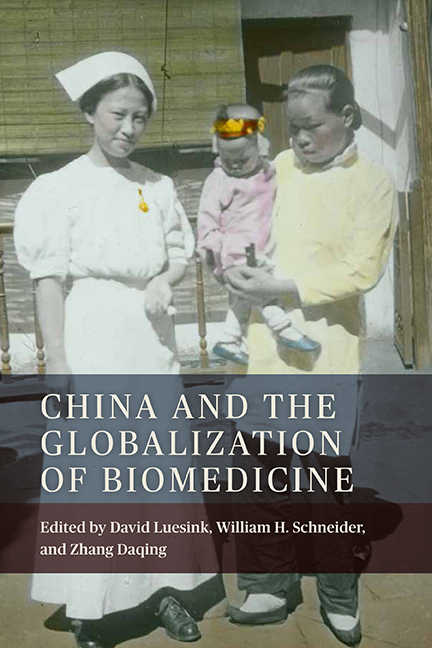Book contents
- Frontmatter
- Dedication
- Contents
- List of Illustrations
- Preface
- Acknowledgments
- List of Abbreviations
- Introduction: China and the Globalization of Biomedicine
- Part One Hygiene and Disease Construction in Late Qing China
- Part Two The Indigenization of Biomedicine in Republican China
- Part Three The Spread of Biomedicine to Southwest China, 1937–1945
- Afterword: Western Medicine and Global Health
- List of Chinese and Japanese Terms and Names
- Selected Bibliography
- List of Contributors
- Index
Introduction: China and the Globalization of Biomedicine
Published online by Cambridge University Press: 27 March 2021
- Frontmatter
- Dedication
- Contents
- List of Illustrations
- Preface
- Acknowledgments
- List of Abbreviations
- Introduction: China and the Globalization of Biomedicine
- Part One Hygiene and Disease Construction in Late Qing China
- Part Two The Indigenization of Biomedicine in Republican China
- Part Three The Spread of Biomedicine to Southwest China, 1937–1945
- Afterword: Western Medicine and Global Health
- List of Chinese and Japanese Terms and Names
- Selected Bibliography
- List of Contributors
- Index
Summary
This volume studies China-based biomedical work and its contribution to the common knowledge and practice of global biomedicine before the 1949 Communist Revolution. The basic contention of this book is that China was not merely a destination for biomedical knowledge and practice from elsewhere but was a fundamental site in the creation of biomedicine. In 1939, the prominent American pathologist Eugene L. Opie wrote the introduction for a special issue of the Chinese Medical Journal arguing that medical science produced in China and published in the issue demonstrated that Chinese physicians trained in the methods of Western medical science were addressing both “conditions particular to China” and also “fundamental problems of pathology and clinical medicine.” This book takes a much wider scope to examine the impact biomedicine had on Chinese society and the impact Chinese society had on biomedicine. It demonstrates that Chinese and foreign physicians based in China pursued research and practiced medicine relevant to China's particularities and also basic to experimental and clinical medicine around the world. China was unique because of the enormous scale of the problems of disease and medical delivery encountered by those who sought to establish a medical system as part of a modern state.
By the 1930s and 1940s, China's attempts to provide preventive and curative medical care for its citizens became an issue of international interest and a key policy problem for Chinese medical reformers like Robert K. Lim (Lin Kecheng) and C. C. Chen (Chen Zhiqian), encouraged by international observers who suggested that China might be a model for the world if it could bring health care to its people at a cost that could be borne through modest per capita government expenditures. As Henry S. Houghton of the Rockefeller Foundation put it, “If the Chinese Government can solve the problem of adjusting competent medical and nursing care to a sum total so that society can afford to pay, it will earn the grateful praise of a troubled world.” Certainly China took advantage of medical ideas and practices produced elsewhere, but it was also a laboratory for a new kind of state-based social medicine established to serve the people and not just the interests of physicians.
- Type
- Chapter
- Information
- China and the Globalization of Biomedicine , pp. 1 - 34Publisher: Boydell & BrewerPrint publication year: 2019



